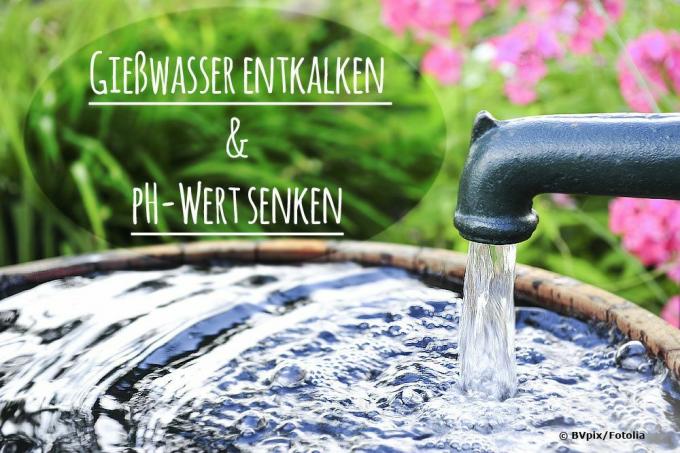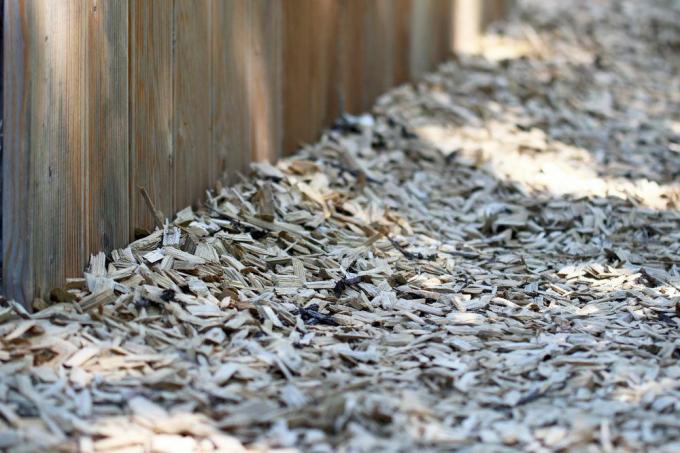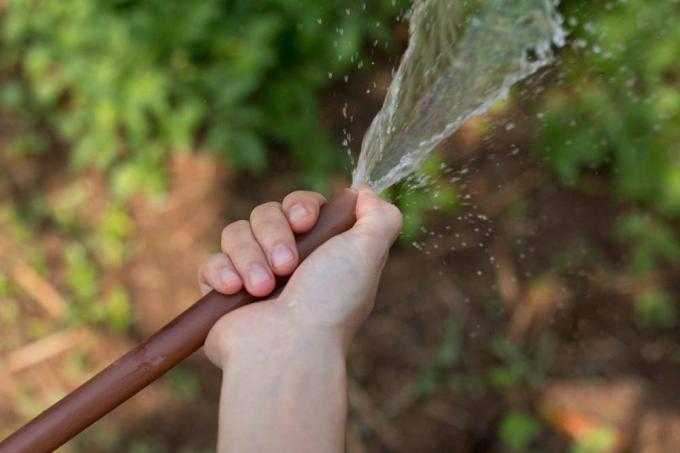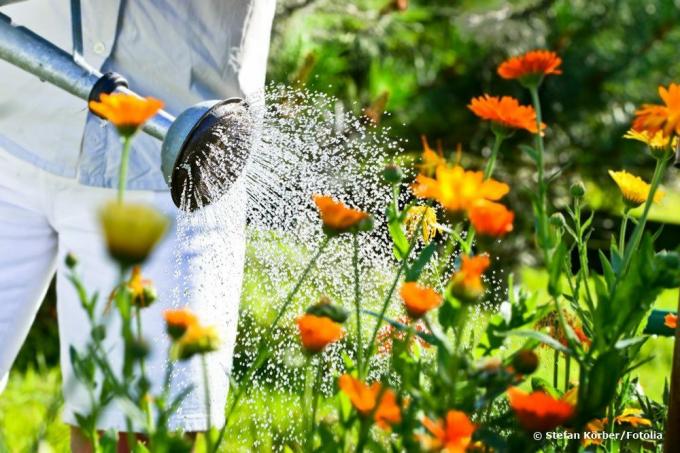
table of contents
- Why descale?
- Measure water hardness
- Descaling
- Lower the pH
- 1. Bark mulch
- 2. Pine needles
- 3. vinegar
- 4. peat
The irrigation water is one of the most important elements for plants, regardless of whether they are kept in the garden, in a tub on the balcony or as a houseplant in a decorative pot. Depending on the species, the plants need a different pH value in order to thrive. It becomes problematic for many, especially tropical, plants in Central Europe due to the degree of hardness of the Water and the high calcium content, which can lead to deficiency symptoms and diseases such as chlorosis.
Why descale?
Does your cabbage feel at home in the limestone soils of southern Germany? You have no problems watering numerous types of vegetables with hard water? Not all plants prefer alkaline and calcareous soils, let alone hard irrigation water. Plants like Rhododendrons, Hydrangeas, azaleas, various types of bamboo or primroses want a neutral to slightly acidic soil so that they can easily absorb the nutrients. Hard tap water has some disadvantages that negatively affect the growth of plants and can even lead to disease:
- Nutrients are flushed out
- The pH of the substrate is increased over time
- white deposits are formed on the substrate and plants
- numerous deficiency symptoms such as chlorosis occur
The more often you give hard water, the worse the plant is doing. The nutrient deficiency is simply too high, which the plants cannot withstand in the long term. You should therefore definitely check how hard the irrigation water is in your region and decalcify it accordingly or lower the pH value.
Measure water hardness
Before you use one of the following solutions for descaling, you should measure the hardness of your water. This allows you to check exactly what degree of hardness it is and act accordingly. The typical water hardnesses are:
- soft (1): below 1.5 mmol, 0 to 8.4 ° dH
- medium (2): 1.5 to 2.5 mmol, 8.4 to 14 ° dH
- hard (3): 2.5 to 3.8 mmol, 14 to 21 ° dH
- very hard (4): from 3.8 mmol, from 21 ° dH
The irrigation water must be medium to soft. Values above 3.8 mmol should be avoided, but are often found in many regions of Germany. The units of measurement refer to the carbonate hardness and, depending on the test agent, either mmol (millimole per liter) or ° dH (German degrees of hardness) are used. The use of mmol is recommended for test kits from abroad. The carbonate hardness describes the solution of substances with carbonic acid, which make the irrigation water harder:
- magnesium
- calcium
- Sulfates
- Chlorides
- Nitrates
- other salts
With the exception of magnesium and calcium, the other salts cannot be dissolved by descaling, but only by lowering the pH value. You can find out water hardness and pH values from the following sources:
- Contact water supplier
- Water hardness test strips (5 - 7 euros)
- Water hardness test kits (around 15 euros)
- pH test strips (7-10 euros)
- electronic pH meter (50 - 150 euros)

tip: A quick check for hard tap water is to use a clear glass that you fill with fresh, cold tap water. If the tap water is whitish and cloudy, it is lime, which makes the water hard.
Descaling
There are two ways to decalcify irrigation water. These ensure that the salts are dissolved in the irrigation water, which makes it softer and therefore ideal for watering all kinds of plants such as orchids. These methods do not lower the pH of the water, which is something that you should pay attention to. If you only need water with little lime, but not directly soft water, these methods are recommended:
1. Desalination
When desalinating, you mix H2O from the tap with demineralized water, which causes it to be descaled. This is offered under various terms, for example battery water, which is H2O, which is free from dissolved salts. If the water hardness is 3, mix 1 part demineralized with 2 parts tap water, if the water hardness is 4, mix 2 parts demineralized with 1 part tap water. You can now use this for watering.
2. Heat
If you heat the irrigation water, the lime is dissolved and it can be used. Either a kettle or a pot can be used for this. After heating, you have to let the tap water stand for a day until it is descaled.
3. Filter
You can easily use water filters to descale the water. Simply let the tap water run through a water filter and you can pour, as the water is deionized in the process.
Tip: You can use all forms of water that are completely pure for desalination, with the exception of ironing water. Although this has the same properties, it is often mixed with perfume, which has a negative effect on the plants.
Lower the pH
Not only the measures for descaling can be used to soften your irrigation water. As soon as you know what degree of hardness your tap water has, you can easily use some means to bring it to a pH value of 4.0 to 6.0. 6.0 is the ideal value for most ornamental plants and many trees, but a value of 4.0 is okay because lowering the value can sometimes be a little inaccurate. Apply one of the following Methods at:
1. Bark mulch
With bark mulch you do not run the risk of lowering the value of the water to such an extent that it is too acidic. This must come from conifers, as they have acidic properties. Alternatively, you can just use conifer wood if you don't have bark mulch available. For an amount of 10 liters of liquid, you need 500 g of bark mulch to reduce the value. Fill the bark mulch into a cotton sack and leave it in the watering can for 24 to 48 hours. Over this period of time, the value of the water drops so much that it becomes soft.
2. Pine needles
Fir needles are just as effective as bark mulch. Firs and spruces are particularly suitable for this, but you can also choose compost based on conifers, as it has the same properties. For 10 l you need 300 g of pine needles, which must act in the same way as the bark mulch for 24 hours. However, you have to close the sack with a rubber band and weigh it down with a stone, as the needles like to swim upwards.
3. vinegar
Vinegar is a method that can go wrong quickly. Since this is an acid, the pH value can drop to 4.0 within a short time. On average, one teaspoon of white wine vinegar reduces the value of six liters of water by 0.5. However, with this method you should always measure the pH value to be on the safe side. Do not be surprised if the value drops significantly after even small amounts of vinegar, this is normal.
4. peat
Peat is a classic when it comes to lowering the pH value in the substrate. However, you can also use the sediment for the irrigation water. It is especially useful if you are afraid of acidifying the water. This is not possible with the material. If you want to use the fabric, do the following:
- use between 100 and 200 g of peat for 10 l of irrigation water
- works with hard water
- fill in a sack or stocking
- close
- Let it work for at least 24 hours
You need as much of the sediment as one gram lowers the value by 1 ° dH. However, keep in mind that this method is not really environmentally friendly or inexpensive. Therefore, the other methods are more recommended.
One advantage of lowering the pH value is that it preserves the important nutrients that are completely lost during descaling. In particular, the content of calcium and magnesium is not reduced, which has a positive effect on the growth of plants. The only substance that is washed out by these agents is carbonate. In addition, lowering the pH value works much better for the plants than decalcifying, since lime is no longer released to the plants from a pH value below 7.0.

tip: An environmentally conscious and at the same time cheap method to unite the water To enable neutral value is coffee powder. Brew a coffee and use the same amount of dried coffee grounds as the peat portion.



